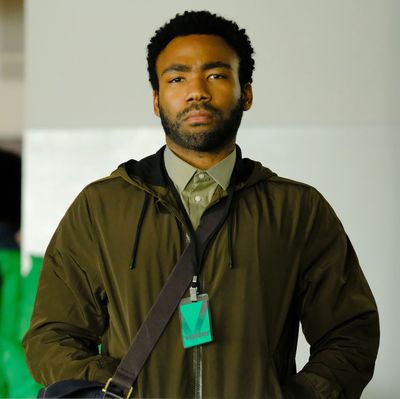
At its core, Atlanta is a show about a rapper and his manager/cousin hustling their way up the Atlanta hip-hop food chain, or at least that’s the idea. That narrative often gets sidetracked, as it does for plenty of rappers, by family duty, legal hiccups (justified or not), and the daily grind to survive. In its first season, we walked with Alfred (Brian Tyree Henry) — who raps as Paper Boi — through the Atlanta streets as he navigated how to open music-industry doors without compromising his drug-dealing day job. With Earn (Donald Glover) handling his music, the two made small strides — Paper Boi got a song on the radio and local clout, but hadn’t become a national success story. But now that the looming winter of Robbin’ Season has arrived, the stakes are raised: Everybody’s gotta eat and Paper Boi’s got more mouths to feed than we were initially aware of.
In Thursday night’s episode, “Sportin’ Waves,” Paper Boi and Earn take a meeting at a streaming start-up to tap into a new cash flow. Rap dominates streaming and streaming dominates music, so Earn figures it’ll be a quick buck. “You’re gonna be happy you did this,” he reassures Paper Boi once they’re there. The company’s walls are covered in Sharpie’d cartoons; they’ve got a personal chef and fully stocked kitchen (“It’s all organic, you know, gluten-free”); there’s an abundance of green and white (both the people and the decor); people are playing ping-pong instead of working. They’ve entered an adult playground.
Paper Boi and Earn are brought into a conference room where a white man in charge of “music outreach” who goes by 35 Savage talks up Paper Boi’s “brand.” The word “reach” comes up again — so does “platform.” They’re meaningless to Paper Boi, but Earn’s already sold. He naïvely hands the guy a CD and gets hit with the first whiff of privilege. He’s told, “Uh, we don’t have any disc drives. It’s a new state-of-the-art system, all wireless and fully integrated into the platform.” 35 Savage asks Earns to email the song to his Hotmail address (very state of the art), but, there’s a glitch and it just won’t play. “That doesn’t make sense,” 35 Savage tells some other white guy. A different white guy panic-smiles in the background while IT has to be fetched. One white guy stalls: “So, uh, I started writing some music …” By now, the odor of fraudulence gets to Paper Boi.
The whole scene is a parody, but the embarrassing disconnect between the gatekeepers of art and art itself should feel painfully familiar to anyone who’s ever stepped inside a music company: In this industry, nothing’s working and everyone’s just buying time until a fix. The particular mishap with 35 Savage was born from truth, inspired by a publicity visit the Atlanta team had at Apple Music where no one there could figure out how to work the Apple TV. “So much of the music business is political. You would think it’s about putting all your energy into the music, but the reality is you have to show face,” Atlanta writer Jamal Olori tells Vulture. “If you’re authentic, like Paper Boi, it can start to feel like prostitution. Everything’s being used to create content.” Paper Boi, being the more intuitive of the duo, picks up on that exploitation faster than Earn when he’s repeatedly asked, in so many words, to sound more gangster recording a radio drop for the platform’s rap playlist. Earn, watching another rapper put on a modern-day minstrel show by dancing on a table for white executives, shrugs off the racial profiteering as a “vibe.” Paper Boi, who later walks out on his own performance, unwilling to be another circus act, would more accurately call it bullshit. He’s right: They end up earning less than expected from the platform in future episodes, but just enough to not feel robbed.
The show’s relationship to the music industry is, of course, complicated by the fact that its star and creator is himself a part of it. Glover raps as Childish Gambino, and has said he will continue making music for the foreseeable future. Though his music was once ruthlessly mocked, his last two albums were Grammy nominated. That attitude shift took less than two years, with seemingly little effort or intent on Glover’s part to change it. Perhaps it’s why so much of the legwork done to further Paper Boi’s career, on his part, happens offscreen. We’ve never seen him physically rap in the studio or spit a single bar, save for the brief ad-libbing he does before walking off the streaming platform’s “stage.” When recently asked if this season is meant to “puncture the fantasy of the quick come-up,” Glover said he prefers not to be preachy.
We witnessed in Atlanta’s first season the instinctive distrust Earn has for the people who stand in the way of getting Paper Boi’s music to the masses, but also saw him betray that instinct and bribe a radio station’s music supervisor in order to cheat the rules of the music game. Earn never really knows what he’s doing as manager — costing Paper Boi some major opportunities this season to chase smaller ones — because no one in this business does. How do hits happen anymore? And how, exactly, does one secure the bag when so few have access to the money? Last season, an old college acquaintance at that radio station warned Earn that “the music business is gross.” This season, the show isn’t shying away from its disdain for the grossness of the industry.


